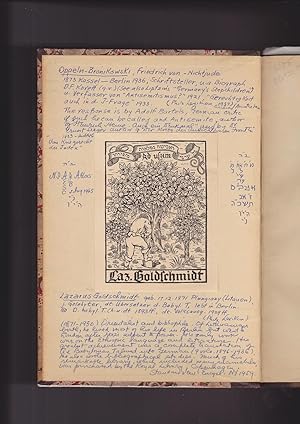About this Item
In German. 72, 52 pages. 236 x 161 mm. Image 4 is merely a publisher's ad for 2 more books by Bartels. These 2 additoinal Bartels books are NOT bound in this volume. Friedrich von Oppeln-Bronikowski Born April 7, 1873 Kassel Died October 9, 1936 Berlin. He was a writer, publisher, translator and historian His grave is located in the Südwestkirchhof Stahnsdorf near Berlin. Friedrich von Oppeln-Bronikowski was born into a traditionalist family of military officers in Kassel. He began a similarly ambitious military career himself, attending a cadet academy then joining a Hussar regiment. A serious riding accident brought his military career to a sudden end, however. Oppeln-Bronikowski turned his attention to a civilian education, studying philosophy and archaeology in Berlin. Afterwards he lived as an independent author first in Italy then in Switzerland. In 1905 he returned to Berlin and published numerous novels, novellas, and short stories. Military life and Prussian history were frequent subjects of his works and appealed to the interests of his contemporaries. He also wrote biographical compositions and essays on cultural history. Oppeln-Bronikowski translated a great deal of French and Belgian literature, including the works of Maurice Maeterlinck. Notably, he also translated Niccolò Machiavelli's The Prince from Italian. With the beginning of the First World War in 1914, Oppeln-Bronikowski was summoned for military service and served with the General Staff. From 1920 to 1923 he was active in the foreign ministry. In his later works Oppeln-Bronikowski opposed the growing antisemitism in Germany. He advocated equitable treatment of Jews with Antisemitismus? Eine unparteiische Prüfung ("Antisemitism? An objective examination") in 1920 and Gerechtigkeit! Zur Lösung der Judenfrage ("Justice! Resolving the Jewish question") in 1932. Adolf Bartels (15 November 1862 - 7 March 1945) was a German journalist and poet. Known for his völkisch worldview, he has been seen as a harbinger of National Socialist anti-Semitism. Bartels was born at Wesselburen, in Holstein, and educated at Leipzig and Berlin. An artisan's son, Bartels studied literature. After 1895 a free-lance journalist in Weimar, he gained a reputation as a Hebbel scholar. In 1897 he wrote a history of German literature that was marked by racist evaluations and rabid antisemitism; it became a pioneering work for National Socialist literary reviews. According to Bartels, even authors whose names sounded Jewish, who wrote for the "Jewish press", or who were friendly with Jews were "contaminated with Jewishness". The noblest task of völkisch cultural policy would therefore be a radical de-Jewing of the arts, and thus the "salvation of National Socialist Germany" (German: National-sozialistisches Deutschlands Rettung; 1924). Bartels led a successful campaign to prevent the unveiling of a statue of Heinrich Heine in 1906. After World War One, Bartels' work experienced an upsurge in popularity, with his followers forming the Bartelsbund (Bartels Society) to promote his ideas; the Bartelsbund later merged with Erich Ludendorff's Tannenbergbund group. Bartels' work achieved "quasi-official" status in Nazi Germany, and Hitler personally awarded Bartels the Alderschild medal, Nazi Germany's highest civilian honour, in 1937. Bartels died in Weimar on 7 March 1945. Bartels's further literary productions included Die Dithmarscher (1898), a historical novel based on his native region advocating ruralism, which sold over 200,000 copies by the 1920s, and Martin Luther (1903); these books are largely forgotten today.
Seller Inventory # 007368
Contact seller
Report this item




